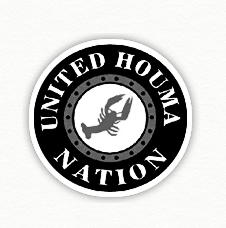
By Isabella Moraga-Ghazi
Strength and resilience is exhibited throughout Houma history.
The Houma people were first “discovered” by white settlers living in the area we now call Baton Rouge. Thanks to the Indian Removal Act, signed into law by Andrew Jackson in 1830, Houma people were forced out of their homelands and into diaspora. Many were pushed to the west on the Trail of Tears. Houma people who were caught escaping the removal were sent as slaves to Cuba. The remaining Houma people settled on the Louisiana Gulf Coast and began to build their communities back up. Some Africans who escaped their slaveholders found refuge with Houma people.
Houma children did not have access to education until the late 1940’s because under Jim Crowe law, they could not go to school with either Black or white children. Schools only went to 7th grade, and there were no certified instructors. Subsequently, native children had to let go of any cultural identity they had. Having long hair, wearing anything related to one’s tribe, and practicing tribal spirituality were all prohibited. “Kill the Indian, save the man” was the government’s genocidal mentality.
Louisiana’s booming oil industry hit Houma people hard. Rich settlers profited off of the resources that this land offers. However, Houma people couldn’t get any of those jobs because most of them didn’t speak English. Houma people mostly spoke French with small bits of their native language.
Right now, Houma people still face a plethora of issues. The effects of Katrina can still be seen in many native communities. Environmental racism penetrates the lives of Houma people. The erosion of wetlands caused by climate change threatens their communities, and clean drinking water is scarce for many native households. The proposed Bayou Bridge Pipeline will further coastal and wetlands erosion and directly affect native people along the coast.
The federal government refuses to recognize United Houma Nation as a sovereign people. This allows the oil companies to extract oil from Houma land without compensation further impoverishing the Nation.
This is only a summary of Houma history. There is hope for the future because we, as Houma people, will continue to protect and defend our homelands. If we don’t, then who will?
